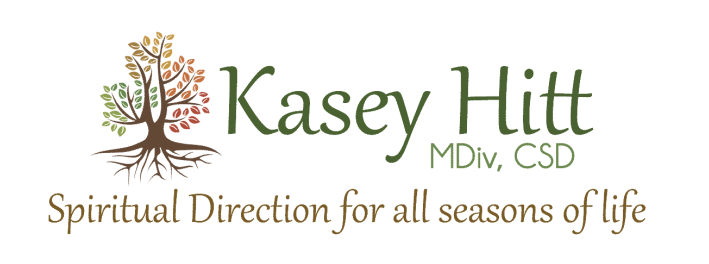 "Three Chairs" often describes the dynamics of spiritual direction. One chair represents the person coming for spiritual direction, one stands for the spiritual director and the other chair is the presence of the true director, the Holy Spirit. "Three Chairs" often describes the dynamics of spiritual direction. One chair represents the person coming for spiritual direction, one stands for the spiritual director and the other chair is the presence of the true director, the Holy Spirit. 1. Spiritual direction is a New Age concept. It's not new at all! Even though it may be for some Protestants, it's a lot older than the New Age label that emerged in the 1970s & 1980s! John Cassian formalized the practice of spiritual direction used in monasteries in the 4th-5th century and based it on Biblical "spiritual directors" such as Eli & Samuel, Jesus & the Disciples, Ananias & Saul, Paul & Timothy/Titus. The early church continued the practice with John the Evangelist (apostle), Polycarp of Smyrna (2nd c. Bishop), Saint Benedict (late 5th/early 6th c.), Saint Patrick (5th c.), Saint Igantius in the 16th century and more. Unfortunately, spiritual direction was lost for Protestants during the 16th century's Protestant Reformation (as things often are in any kind of divorce). Years of suspicion and fear of anything Catholic combined with the tendency toward self-sufficiency kept Protestants from engaging spiritual direction. With the growing need for this kind of spiritual companionship, improved relations between Catholics and Protestants, and the admission that healthy spiritual practices were discarded in the divorce of the Reformation, recovery has begun in the past 40 years. Ancient practices like spiritual direction and Lectio Divina have emerged once more to be offered as a gift to the whole Church. Spiritual directors are found in all religions. There are even interfaith spiritual directors! What sets apart Christian spiritual directors is that our practice rests on over 2000 years of Christian discernment and 3500-3600 years of Jewish discernment. So the Bible and Jesus-followers beyond the Bible shape our listening, questions and discernment. 2. A spiritual director is a guru who has all the answers or a mind-reader. While spiritual directors may have gifts of discernment, wisdom, teaching and even prophecy, we neither have all the answers nor are we mind-readers. We come alongside others, bringing our gifts and presence to listen and discern the voice and action of the One who is the true Director, the Holy Spirit (symbolized by the third chair in the above photo). My friend and colleague, Scott Spradley, likes to say that we [spiritual directors] are "one of the two or three gathered to listen to the Spirit who is in our midst." Matthew 18:20 By the way, we, too, need spiritual direction. A healthy spiritual director meets regularly with a spiritual director! 3. Spiritual direction is the same thing as Christian counseling. Although there is some overlap, we make it very clear to those who come to direction that it is not counseling. We are specifically looking at a person's spiritual life and growth. While we look at God's presence and invitations in all of life, direction doesn't focus on specific relational issues or problem-solving. So it is quite normal that during spiritual direction we may discern the Holy Spirit's "tap on the shoulder" saying, “It's time now, you have everything you need to deal with this specific issue in counseling.” Spiritual directors are trained to know when to refer directees to therapy. 4. Becoming a spiritual director and coming to spiritual direction is easy. My supervisor says spiritual direction is "a sheer gift from God." However, while people are gifted for the work of spiritual direction, if a director hasn't at least gone through a two year process of certification from a reputable, accredited school (Seattle School, Perkins, Garrett, Shalem), I'd be a little wary. Besides being schooled in spiritual growth, formation, disciplines and practices, most of us have additional schooling in theology and psychology which broadens and deepens discernment. As to whether or not being a spiritual director or coming to spiritual direction is easy...helping people befriend silence and other ways of recognizing the still, small voice can be a challenge for the director and the directee! Being fully present to a person can often be hard work! And spiritual growth can be painful even as it leads to freedom & life. There are some sessions we've got to allow directees to leave with things being messy or not feeling very good! 5. Spiritual direction is only for clergy, creatives, contemplatives, or older adults. It's for everyone who desires companionship on their spiritual journey...I've met with church-goers, unchurched, those who've left the church, Southern Baptists, Catholics, Methodists, Nazarenes, AME, stay-at-home moms, professors of psychology, engineers, chemists, men and women, high school students, LGBTQ, pastors and para-church workers, and I've worked in conjunction with a therapist with those who have mental illness. People of all ages and from all walks of life may want to deepen their spiritual life and discernment, a spiritual director is a good companion along this journey. 6. There is one way of offering formal spiritual direction and that is seated across from one another in a quiet room. While I offer traditional spiritual direction as well as Skype spiritual direction, there are other directors who offer different formats. Scott Spradley offers spiritual direction in coffee shops and walking on a trail. Whitney Simpson combines spiritual direction with yoga for creating greater space to listen to the ways God is speaking in and through the body. 7. Spiritual direction is a fad. As the response to the first myth states, spiritual direction has been around for a long time! However, anything of value can be in danger of becoming a fad when it is cheapened. It may become faddish to a certain individual who comes out of curiosity and leaves when the work of the spiritual life gets too vulnerable. Or in rare instances, a spiritual director may have become certified because it was something to add to their "spiritual collection" and not because of giftedness or calling. While the way of offering spiritual direction (like Skype) may change, spiritual direction offers "wisdom for the long walk of faith" as Henri Nouwen put it. Fads are here today and gone tomorrow. Comments are closed.
|
AuthorKasey is a scarf, ball and club juggling spiritual director just outside of Nashville, TN. Play helps her Type-A, Enneagram 1 personality relax, creating space for poetry and other words to emerge. She also likes playing with theological ideas like perichoresis, and all the ways we're invited into this Triune dance. Archives
January 2024
Categories
All
|
By clicking “Sign up for E-News” I consent to the collection and secure storage of this data as described in the Privacy Policy. The information provided on this form will be used to provide me with updates and marketing. I understand that I may modify or delete my data at any time.

 RSS Feed
RSS Feed

